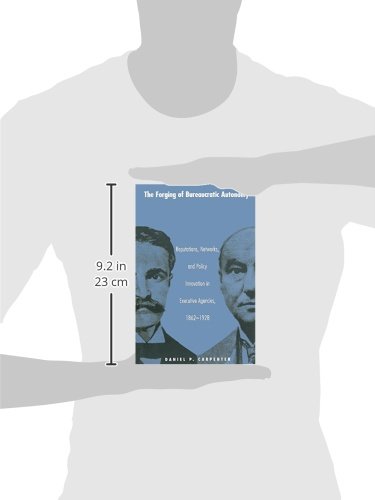Customer Services
Copyright © 2025 Desertcart Holdings Limited
Desert Online General Trading LLC
Dubai, United Arab Emirates




The Forging of Bureaucratic Autonomy: Reputations, Networks, and Policy Innovation in Executive Agencies, 1862-1928.
A**A
Got here quickly
Looks good. Hope to read it soon.
J**M
Excellent Theoretical and Empirical Work, Narrow Academic Focus
This is a must read book for anyone interested in American political development, as long as you don't mind the academic language and narrow focus. As a study on statebuilding it is too narrow, but as a study of the development of bureaucratic autonomy it is a major achievement. In my opinion, Carpenter also shortchanges the antebellum era. It is an excellent compliment to Skowronek's book "Building a New American State." For a different perspective on the 19th centutry American state, see Jensen's book "Patriots, Settlers, and the Origins of American Social Policy" and "Shaped by War and Trade" edited by Katznelson and Shefter.
S**C
Surprisingly Interesting Read!
I was assigned this book for a paper in a Master's level Public Policy course, and it was surprisingly interesting. The book gives a detailed account of the bureaucracy involved with the creation and early operations of the United States Postal Service and United States Department of Agriculture, and the process by which the departments gained autonomy within the federal government. Similarly, it also points out the steps which led to the eventual loss of bureaucratic autonomy by the Department of the Interior. The book is long, but it's a relatively easy read, and it made for a pretty interesting paper, if I may say so myself.
S**O
The Origins of the Deep State
This book is a detailed look at how government agencies gain independence and policy-making power. The focus is on the growth in power of the Post Office and USDA from 1880-1920 (before and after the Progressive Era) with a bit of attention to the question of why the Department of Interior did not make the same leap during this period.The book is a triumph in research. I knew nothing about these agencies during this time (and I study government regulation). Carpenter argues his thesis convincingly and marshals evidence supporting it throughout the book. His thesis is that high level civil servants and the external networks that support agencies are the key factors in making an agency autonomous.One critique and one question remain. The book is dense and long. Carpenter is splendid in finding every piece of evidence that supports him (and some that don't) but this leaves the reader a bit deadened at times. The empirical portions of the book (the histories of the Post Office and USDA) can be hard going at times.The question I left the book with is what does it tell us about today? Does it explain the ability of agencies to resist attempts at control such as those currently being practiced by the Trump Administration? Or is (for example) Tillerson's purging of the State Department exactly the way one would weaken the agency? Will the external networks that support government agencie be sufficient to protect them? I don't have answers but maybe Carpenter does.
A**D
bureaucratic autonomy - before the New Deal!
Carpenter's study of bureaucratic autonomy is innovative in a few respects. First, he takes seriously intra-country differences in bureaucratic autonomy. As he shows, some agencies are more autonomous than others. Second, he looks at agency autonomy before the New Deal revolution, removing that as an intervening variable. Finally, the book uses historical narratives of the Postal Office, USDA, and Interior. At times, the book contains too much a history of the agencies and not enough theory-building. However, the book does produce interesting theoretical arguments about how bureaucracies gain autonomy in large part through outside interest-groups and networks. Definitely worth reading for scholars of bureaucracies.
F**N
The work of federal bureau chiefs
This book narrates several episodes of executive leadership in the USPO, the USDA, and Department of the Interior during the last decades of the 19th and the early decades of the 20th centuries. The author shows how post office and agriculture department bureau chiefs effectively managed upward, outward, and through their organizations to create public value and thereby gained considerable operating discretion for themselves and their departments and how managerial failures in interior's reclamation bureau resulted in its loss. For students of public management, this book provides case evidence for many of Mark Moore's strongest normative claims. It is first rate, well written, plausible historical narrative. Its weaknesses are too little attention to the creation of public value (perhaps because that would smack too much of normative economics) and far too much attention to issues that could only be of interest to academic political scientists.
P**N
Fast delivery
Product arrived as described and quickly
Trustpilot
1 month ago
1 month ago